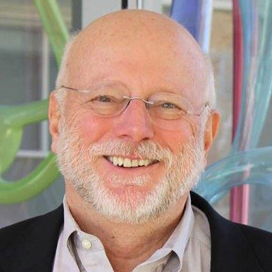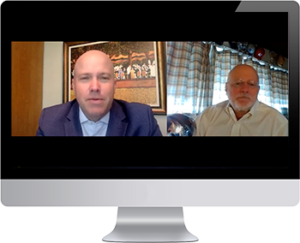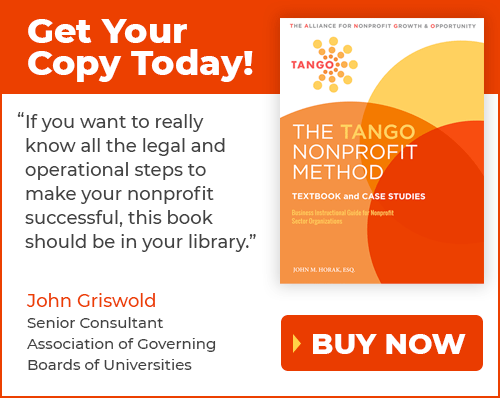Jack's Journal - May 2020
COVID-19 and the State of the Nonprofit Sector – An interview with Louis Fawcett
Jack Horak
Director of Nonprofit Education & Consulting
TANGO

 On April 29th I had the pleasure of conducting a 15-minute Zoom interview with Louis Fawcett on the state of the nonprofit sector in the age of COVID.
On April 29th I had the pleasure of conducting a 15-minute Zoom interview with Louis Fawcett on the state of the nonprofit sector in the age of COVID.
Louis is the President of the National Association of Nonprofit Organizations and Executives (NANOE) in Charleston, South Carolina. He is, by training, a Lutheran Minister, and he has had a long career in the philanthropic sector as a fundraiser and a thought leader – and a courageous one at that. Louis has fearlessly challenged the nonprofit sector’s fund raising and operating orthodoxy as part of a very well-reasoned and sustained effort to shake the sector from its dogmatic slumber — to reboot the sector to meet the challenges of the 21st century. His reasoning is sound, and I give him credit for his diligence in the face of some unfortunate and unfair criticism from the establishment.
Time does not permit a detailed explanation of his thought system – but let me give you a brief synopsis to set the stage for my summary of the interview. At its core, the system is based on a reordering of the sector’s relationship with free enterprise, money, and wealth – as embodied in eye catching phrases such as “money is more important than mission” (as one example), and bringing free market practices to nonprofit governance, management, and fundraising. If the phrase “money is more important than mission” strikes you as rebellious or an apostasy – – I suggest you turn to my explanatory essay NANOE’s Eruption onto The Nonprofit Scene to be found on the web publication Inside Charity.
 With that said, let me summarize the principal points made during the discussion – but I urge you to check out the video at the bottom of this article:
With that said, let me summarize the principal points made during the discussion – but I urge you to check out the video at the bottom of this article:
- Well managed and capitalized nonprofits will likely survive the COVID quarantine and others will fail even if they survive in the short run with cash assistance from the PPP and other government assistance programs.
- Too many nonprofits continue to follow ideas that are 40 -50 years old — such as devoting 95% to 100% of their time on service delivery and working hard to pay “yesterday’s bills” as opposed to investing adequate time in “deep donor relationships.” In other words, under this model at least one-half of the CEO’s time should be spent raising money with other executive tasks delegated to members of the management team. Raising money should not be viewed as a necessary evil or an afterthought that gets passed down to mid-level staff – but an honor, a privilege, and a challenge. CEOs should be hired based on their ability to bring money to the organization – not unlike the fund-raising role that college and university presidents play in the modern era.
- Nonprofits should approach donors with a system with similarities to the way businesses attract both customers (this point) and investors (next point). Louis analogized to the “customer experience” that draws patrons to a business like Starbucks over and over again The same can be done with donors if they are provided with positive donor experiences and interactions with the CEO level staff on a reasonable and timely manner.
- The “investor experience” is derived from the use of annual program performance audits (objective performance metrics) from outside professionals that provide a disinterested opinion on how well the mission is being performed – and this information is shared with the donors even if in some years it is not as good as the board would like.The metrics question is important because the sector has for too long relied upon the mission statement per se (what it intends to do) to attract donations as opposed to some reasonably objective assessment of its actual performance in fulfilling the mission. It is like the difference between a “pass fail” course and a fully graded course — and if donors are provided with a bona fide fully graded investor experience (as well as a “customer experience”) they are likely to stay with you through both good times and bad.
- There is plenty of data available through credit reporting agencies and similar sources to find the high net worth donors in the community and many types of social media to contact them professionally. He has a system developed for this purpose.
- We agreed that a reformation of this magnitude must start at the top or it will not succeed – the board and then senior management need to be on the same page and be willing to roll up their sleeves to do these things – as, for example, it could require replacing the CEO with one better able to fundraise — and giving the new CEO an employment agreement that includes specific money raising targets. In the business world CEO’s are given employment contracts with expectations about profitability and expansion and the same can be done in the nonprofit sector as well.
At the end of the interview we agreed to do a follow up that will focus on the issue of metrics (see above). The issue is important enough to have warranted a chapter in the newly released Stamford University publication The Nonprofit Sector – A research handbook. The chapter was written by Paul Best who was the Packard Foundation CEO and it summarizes the state of the metrics issue at this point in the sector’s history.
If you have any questions, or suggestions for future interview topics, please contact me () or Louis ().
More From TANGO
COVID-19: The Profound Significance and Resilience of the Nonprofit Sector
I typically use the metaphor of a three-legged stool to explain the nonprofit sector to students and readers. I start by explaining that there are three sets of tasks generally necessary for any society to function.
Nonprofits should adopt these private-sector practices
On Oct. 14th Jack Horak discussed a new wave of thought called “stakeholder capitalism,” which injects some fundamentally new DNA into corporate America by requiring governing boards, for the first time, to consider social justice as they make their business decisions, even if doing so lessens shareholder profits.
CONTACT
TANGO
Jack Horak
Director of Nonprofit Education
TANGO – The Alliance for Nonprofit Growth & Opportunity
135 South Road
Farmington, CT 06032
877-708-2646
tangoalliance.org
